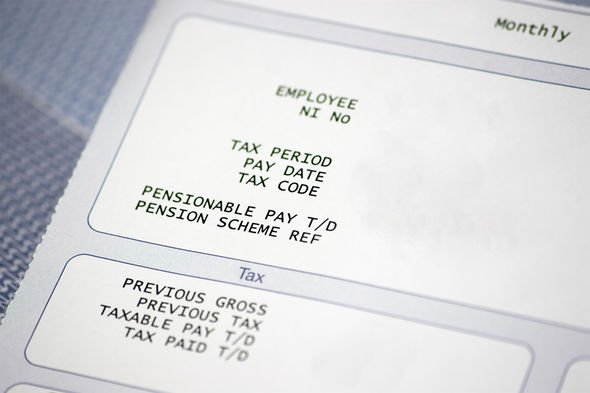HMRC Tax Code Changes: How Savings Affect Your Tax

Table of Contents
How Savings Impact Your Tax Code
Your savings, specifically the income generated from them, contribute to your overall taxable income. This includes interest earned on savings accounts, dividends from investments, and rental income. Your total taxable income, including your employment income, determines which tax band you fall into and, consequently, your tax liability. The more you earn, the higher your tax rate may be.
-
Interest Earned on Savings: Even small amounts of interest earned on savings accounts can push your total income into a higher tax band. For example, if you are close to the higher-rate tax threshold and earn a significant amount of interest, this could increase your tax liability considerably.
-
Exceeding Your Personal Allowance: The personal allowance is the amount you can earn tax-free. If your savings income, combined with other income sources, exceeds your personal allowance, you will begin to pay income tax on the portion above the allowance.
-
Cumulative Income: Your tax liability isn't determined solely by your salary. It's calculated based on your cumulative income, meaning all sources of income are added together (employment, savings, investments, etc.) before tax is calculated. This emphasizes the importance of understanding the tax implications of all income streams.
Tax-Efficient Savings Vehicles
Fortunately, you can mitigate the tax burden on your savings by utilizing tax-efficient savings vehicles. These products are designed to minimize your tax liability and help you grow your wealth more efficiently.
-
ISAs (Individual Savings Accounts): ISAs offer a tax-free wrapper for your savings and investments. Interest, dividends, and capital gains earned within an ISA are generally tax-free, making them a popular choice for long-term savings and investments.
-
Pensions: Contributions to pension schemes often attract tax relief, reducing your overall tax liability. The government effectively tops up your contributions, making pension saving a tax-efficient way to save for retirement. The exact amount of relief depends on your income tax rate.
-
Investment Choices: Even within tax-efficient accounts like ISAs, different investment types carry varying tax implications. For example, dividends may be taxed differently than capital gains. Understanding these nuances is crucial for effective tax planning.
Understanding Your HMRC Tax Code
Your HMRC tax code is a crucial element in understanding your PAYE (Pay As You Earn) tax system. It essentially tells your employer how much income tax to deduct from your salary each month. This code is based on your estimated income and personal allowance for the tax year.
-
Components of a Tax Code: A typical tax code consists of numbers and letters. The numbers represent your tax-free allowance, while the letters indicate any adjustments, such as tax relief on pension contributions.
-
Emergency Tax: If your employer doesn't have enough information about your income, they might apply emergency tax, which deducts a higher rate of tax than necessary. This is usually temporary, and you'll receive a repayment if the overpayment is significant.
-
Checking Your Tax Code: You can easily check your tax code online via the official HMRC website: [Insert HMRC Website Link Here]. You should regularly check this to ensure the information is accurate and reflects your current circumstances. If you are self-employed, you will need to complete a self-assessment tax return.
Planning for HMRC Tax Code Changes
Proactive tax planning regarding your savings is vital to minimizing your tax liability and maximizing your wealth.
-
Forecasting Tax Liability: By carefully tracking your income from all sources, including savings, you can forecast your tax liability more accurately and anticipate any potential tax code adjustments.
-
Importance of Budgeting: A well-structured budget helps you manage your finances, track your income and expenses, and make informed decisions about savings and investments, ensuring you stay within your tax threshold.
-
Seeking Professional Advice: For complex tax situations or if you need personalized advice on managing your savings and optimizing your tax planning, consulting a financial advisor is highly recommended. They can offer expert guidance tailored to your individual circumstances.
Conclusion
Understanding how HMRC tax code changes affect your savings is essential for effective financial management. Your savings income influences your overall taxable income, and utilizing tax-efficient savings vehicles like ISAs and pensions can significantly minimize your tax liability. Proactive tax planning, including budgeting and possibly seeking professional advice, is crucial for managing your finances effectively and ensuring you don’t overpay tax. Take control of your finances and learn more about how HMRC tax code changes affect your savings today!

Featured Posts
-
 Benjamin Kaellman Huuhkajien Uusi Taehti Maalivire Ja Kasvu Kentillae Ja Niiden Ulkopuolella
May 20, 2025
Benjamin Kaellman Huuhkajien Uusi Taehti Maalivire Ja Kasvu Kentillae Ja Niiden Ulkopuolella
May 20, 2025 -
 Us Army Missile Launcher Test In Australia Strategic Implications And Regional Tensions
May 20, 2025
Us Army Missile Launcher Test In Australia Strategic Implications And Regional Tensions
May 20, 2025 -
 Politique Camerounaise Macron Et L Election Presidentielle De 2032
May 20, 2025
Politique Camerounaise Macron Et L Election Presidentielle De 2032
May 20, 2025 -
 Argent Et Football Kylian Jaminet Critique Le Transfert De Melvyn
May 20, 2025
Argent Et Football Kylian Jaminet Critique Le Transfert De Melvyn
May 20, 2025 -
 Selling Sunset Star Calls Out La Landlords For Price Gouging After Fires
May 20, 2025
Selling Sunset Star Calls Out La Landlords For Price Gouging After Fires
May 20, 2025
